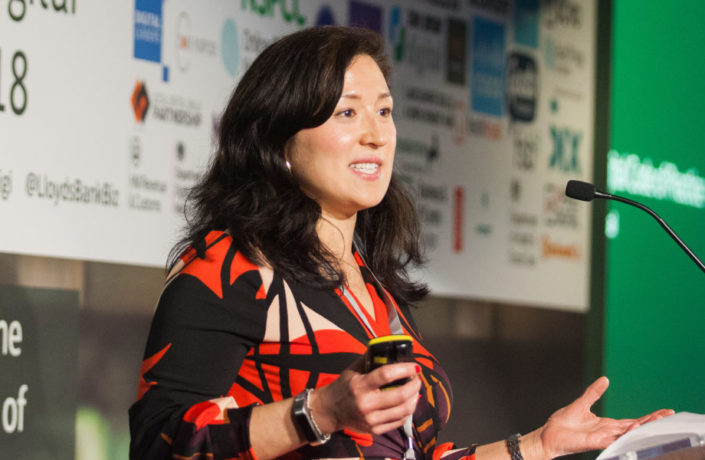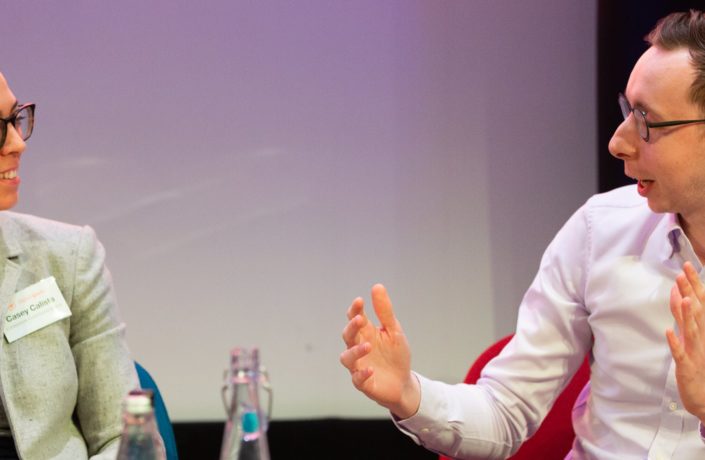 News
News
Summit strikes chord on downside tech
Posted on 10th October 2018
Last week’s Power & Responsibility Summit covered tax, the gig economy, regulation, fake news, mental health, future work and – perhaps above all – trust in tech. DigitalAgenda director Julian Blake says the summit worked because it struck a chord with public and professional concern.
DigitalAgenda’s first Power & Responsibility summit, held last week at London’s British Library, did not shy away from tricky issues. We set out to debate regulation, trust and the unintended consequences of the digital age. That we did, triggering a whole set of new debates along the way.
In the world of digital technology, we now have tech companies worth trillions, platforms used by billions, using technologies that seemingly have the power to make or break governments – and what Ai promises makes many uneasy about what it means to be human.
We also know that digital technology gives us access to knowledge we once only dreamt of, that can help save lives, bring us together and help us save the planet, even from ourselves. We are optimistic about the power of technology – but we also know it must be used responsibly. That is what Power & Responsibility was about.
Check out our summit photo gallery with pictures by Fran Hales.
The summit was grounded by advance thinking around the issues on the table, in the form of a discussion paper written by digital commentators Jess Tyrrell and Eva Appelbaum – who also contributed thoughts across the summit day.
Jess and Eva’s discussion paper contains 10 challenges we face and 10 ideas for change – and it is open as a commentable doc for your thoughts direct, until Wednesday 31 October.
Trust, or the lack of it, is a major factor underlying public anxiety about technology. For the last 18 years marketing agency Edelman has produced an annual ‘trust barometer’ showing the extent of public faith in business.
 In summit week, Edelman released new ‘earned brand’ trust data for 2018 – and Mark McGinn, director of brand and social purpose, joined as an expert partner to present findings to the summit, setting out trust challenges for a sector whose activities are increasingly questioned.
In summit week, Edelman released new ‘earned brand’ trust data for 2018 – and Mark McGinn, director of brand and social purpose, joined as an expert partner to present findings to the summit, setting out trust challenges for a sector whose activities are increasingly questioned.
Read Mark McGinn’s summit presentation.
The tech trust deficit ran through the summit day like a stick of rock, and we had brilliant contributions from leading thinkers including Jamie Bartlett, director for the centre for social media at Demos and Sonia Livingstone, chair of the truth, trust and technology commission at LSE.
It would have been hard to talk about the downsides of technology without the presence of at least one of the big five global tech businesses in the room. So we were glad that Google took up the invitation to talk about its role as a business in the UK economy, and also its efforts to work as a responsible business.
Katie O’Donovan, Google UK’s public policy and government relations manager (pictured), took up the challenge and joined the debate on power, responsibility and the economy, engaging with IPPR director Tom Kibasi (pictured) in particular on thorny issues of tax, the gig economy and the impact of online advertising on publishers.
 Dom Hallas of startup policy voice Coadec and Digital Catapult chief executive Jeremy Silver fed into the conversation on digital’s impact on the changing economy, and how new business models can deliver tech for the public interest too.
Dom Hallas of startup policy voice Coadec and Digital Catapult chief executive Jeremy Silver fed into the conversation on digital’s impact on the changing economy, and how new business models can deliver tech for the public interest too.
The role of regulation in helping tackle digital downside issues was a key summit theme. Chi Onwurah MP, Labour’s industrial strategy, science and innovation spokesperson, set out her party’s plans to regulate the technology sector if elected to government. She set out more detail on Labour’s plans for a single regulator.
The government’s approach to regulation for online safety and more was set out by Ollie Buckley, deputy director for digital charter and data ethics at DCMS. Industry perspective came from Carla Baker, the senior government affairs manager at Symantec, while Reason Digital director Matt Haworth put the case for purposeful innovation unstifled by regulation.
Louise Marston trailed a new white paper at Doteveryone, stressing that, while regulation was needed, work was also needed by business and in education.
Despite its downside emphasis, the summit was no tech-bashing affair. We believe digital offers the best hope possible for solving our most intractable challenges. So we explored tech responses to challenges, including tech-for-good solutions to problems often associated with digital innovation.
Accordingly, futurist Adah Parris talked data for good with Emma Prest of Datakind UK (pictured); safe digital identity with Julie Dawson of Yoti; mental health with Nick Taylor of Unmind; and trust and engagement with Kajal Odedra of Change.org UK.
When it comes to mental health, there is no doubt that digital has a double-edged impact. The detrimental effects of social media are increasingly well documented – but wellbeing benefits are sometimes underplayed.
Evangelists Pete Trainor of Us Ai and Beep founder Katz Kiely set out the shortfalls of existing design as well as tech’s ability to flag ill health. Simon Gunning of the Campaign Against Living Miserably offered the men’s mental health perspective.
The digital revolution is far from the first big change humanity has had to face. Author and tech polemicist Andrew Keen (pictured) is convinced there are lessons from the past to help us stay human in the digital age.
His book, How To Fix The Future, has been described as “the most significant work so far in an emerging body of literature about the state of the internet, and laying groundwork for how to fix it” – and Keen dispensed distinctive wisdom on big tech, China and surveillance – and tongue in cheek saw an analogue future with kids embracing cassettes.
It would have been remiss not to look at our fears for an Ai-driven future – and our final summit session did not disappoint. Imogen Parker of the Ada Lovelace Institute asked how we move the dial from ‘dystopian doom’ to a more positive outlook.
Jonnie Penn of Harvard University’s Berkman Klein Center for Society and Internet, Harvard University joined Rob McCargow of PwC UK and Sue Daley of techUK for a rousing debate that left many feeling optimistic.
A big thanks to our summit chair Oli Barrett, who brought his inimitable style to bear on the proceedings, bringing a perfect balance of gravity and levity to the matters at hand, and engaging the audience in a way that only Oli can.
 Outside the event venue, the social reach of the summit was extraordinary. We attracted an audience of 1.5m and a total of 7.8m impressions. We have created a Twitter moment summing up some of the best summit moments and social reaction to them.
Outside the event venue, the social reach of the summit was extraordinary. We attracted an audience of 1.5m and a total of 7.8m impressions. We have created a Twitter moment summing up some of the best summit moments and social reaction to them.
We have had great feedback from those who came. Chi Onwurah called her session “one of the best informed and most constructive debates I’ve participated in”, while Maria Axente of PwC said the summit was “surely one of the best events I have attended.” Thanks for those comments – and for all the other feedback.
A major aim for us from our first summit was to convene the sometimes disparate worlds of technology, business, policy and academia. All four and more turned up, and we are glad to have helped bring people together, to think about and start to plan ways forward.
Thanks to all who came to the summit. We have started a conversation and we look forward to continuing it in the months ahead.
The Power & Responsibility discussion paper is open for comments until 31 October.


